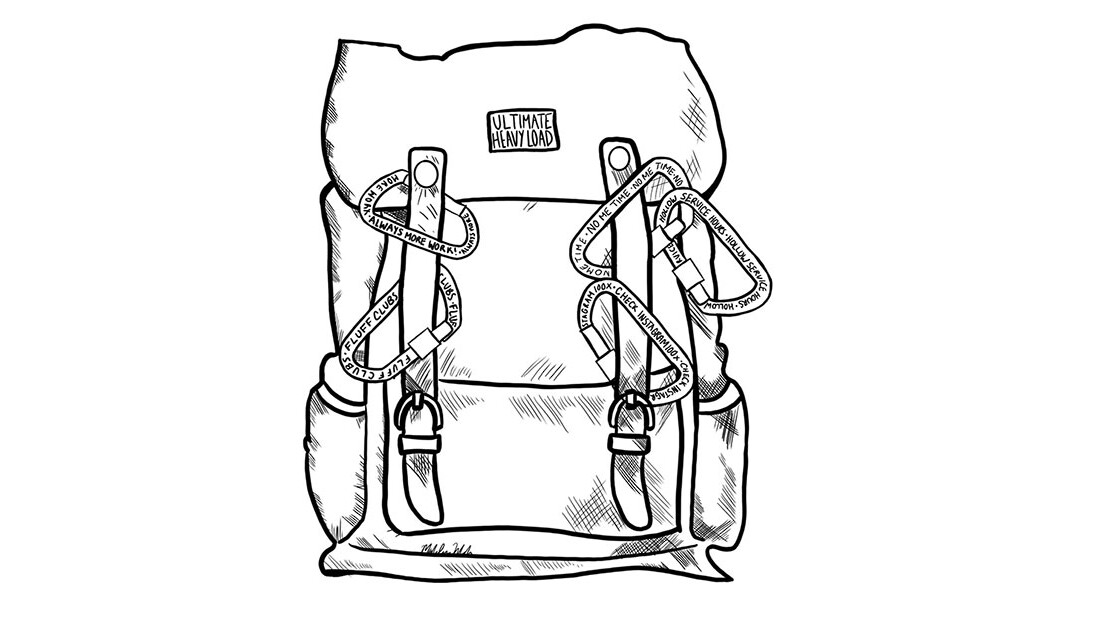Empathy: Considering another’s perspective in a college application
In preparing their applications to college, high school students are encouraged to be authentic, engaged, passionate, and committed. These are indeed great aspirations, and, hopefully, kids get the message that being true and honest with themselves and putting together a good college application should not be at odds with each other.
One quality usually missing from this list of exhortations, though, might be the most important one: be empathetic. Empathy is a powerful idea whose definition often depends on context. For some, empathy is the same as sympathy, the state of caring for others and “feeling their pain.” It is an emotional response to a shared humanity. “I work in a food pantry for the poor because I feel bad for those who feel hunger; I teach kids how to play basketball because I know how much joy I get from it.” We believe such compassion to be a powerful part of children’s sociality and work to cultivate it. And when colleges ask applicants to write about how they help make the world a better place, it is this kind of empathy that students lay claim to and that admission officers wade through.
In urging students to feel sympathy for those with less privilege than they have, though, we might want to encourage them to do more than feel another’s pain. We also want to suggest a shift in perspective in which they go beyond describing their response towards imagining and interrogating how the other side in this equation feels. Social psychologists call this “perspective taking,” and define it as “the ability to understand how a situation appears to another person and how that person is reacting cognitively and emotionally to the situation.”
Why does this matter to how students present themselves in their college applications? In reading about or listening to how students describe their community service, I am always struck by how they see it as a one-way street: they feel bad for someone who might not have what they do and tell us what they have done to alleviate that need. They rarely seem to realize that there is also another side in this philanthropic equation. The result is variations on the so-called “poor but happy villagers” community service experience that has become so frustrating – and even toxic – to admission officers. They read countless essays about suburban kids teaching, contributing to, and “giving voice” to those who are less privileged. These essays are filled with good intentions but lack even a rudimentary understanding of the inequality and lack of reciprocity in such philanthropic exchanges: the less privileged are merely there to be acted on, to be helped and, hopefully, to be grateful for the assistance.
Don’t misunderstand me. I think such service work can be hugely enriching to a student and can reflect a well-honed sense of social obligation, which I applaud. But we might want to open a conversation with young adults – as parents and as counselors – about what and who is on the other side of that helping hand; to add to their emotional sympathy for the less privileged some of the awareness that comes from a more rational empathy.
Shifting perspective and seeing an exchange from the viewpoint of another, also offers students useful insights about other parts of the application process and, indeed, of life. When students present themselves in essays and interviews, it is often clear that they have not given much thought to who their audience is. It is a one-way conversation: they ascribe to themselves the qualities they feel colleges value (I am determined, helpful, diligent, resilient, keen to help others). It does not occur to them that what they’re trying to say may not be what the other side is hearing! They reference extensive foreign travel, for example, sure that the admission reader will appreciate their global citizenship, when, in fact, the reader hears a blithe catalog of great privilege. And when they describe tutoring an underprivileged fellow student, they rarely consider that admission officers might have been such low-income students themselves — and could find their tone patronizing.
As educational counselors we work in the hope that whatever kids learn from applying to college – about choices and consequences, about good writing – they will bring to bear on other parts of their young lives too. In this, there are few skills more valuable to them than moving from seeing the world strictly through their own eyes, to understanding that in their every interaction with another, there is another viewpoint present too.
The Advantages of Boarding School
Students who attend boarding school get to live, learn, and thrive with motivated peers from around the world, supported by compassionate and dedicated faculty who serve as teachers, coaches, and dorm parents. At boarding school, students wake up each morning in a community buzzing with energy and know they are part of something special and unique.
LIVE
Life at boarding school is exciting and full of possibilities. Boarding school students report spending more time engaging with their communities and exploring their passions than students at private day schools and public schools[1]. Since students live and work alongside each other and the faculty every day, from the stage to the studio to the field, students have nearly endless options for immersing themselves in their interests and discovering new ones.
Along the way, students form meaningful relationships with caring educators who offer inspiration, guidance, and motivation. Coaches, teachers, and dorm parents are committed to creating supportive, nurturing environments where students feel inspired to grow as learners, members of the community, and leaders. In fact, 77% of boarding school students say that boarding school gives them the opportunity to lead[2].
LEARN
Going to class at boarding school is inspiring. Not only do students learn from high-quality teachers, but students also report being surrounded by motivated peers, making the learning environment rich and rewarding. Students’ classmates are also their teammates, bandmates, and roommates — so the learning doesn’t stop at the classroom door. Exciting and engaging conversations happen in dorm common rooms, fueled by snacks made by dorm parents.
Students feel academically challenged at boarding school. Small class size and easy access to faculty outside of the academic day allow students individualized attention so that they can also feel supported on their rigorous academic journeys. Teachers meet with students one-on-one to review everything from math concepts to essay writing techniques. At boarding school, students are both challenged and supported and feel intellectually inspired and academically satisfied.
THRIVE
Ready to face the challenges of college and beyond, boarding school students are prepared to thrive in the world after high school. Living on campus, learning with motivated peers, and engaging in leadership opportunities are just a few of the ways that boarding school sets students up for success. A majority of boarding school students report feeling prepared to succeed in college.
When asked if they would go to boarding school all over again, 90% of graduates said yes! At boarding school, students develop self-motivation, independence, and the ability to think critically and creatively. These skills not only help with college readiness, but they also set the foundation for career success later in life. Boarding school — and all that it has to offer — is an experience that lasts for a lifetime.
[1] Begin the Adventure of Your Life, © Copyright 2009-2019 The Association of Boarding Schools
[2] Begin the Adventure of Your Life, © Copyright 2009-2019 The Association of Boarding Schools
How Heavy Is Your Backpack?
While I was walking through the snow (yes … we still get snow in March in Rhode Island) with one of my best friends a few weeks ago, she began telling me about a coaching framework she’s been working on—centered around a backpack. My friend Brountas (I call her by her last name … something that stuck during our college years together) owns an executive coaching business (https://www.linkedin.com/in/jen-brountas-16b731/). She uses the backpack analogy as a way to help her clients prioritize the things occupying their headspace. A backpack is a useful tool, but it has a limited capacity and a tendency to collect stuff that weighs you down. I couldn’t help but think that her framework and analogy could benefit my students as they transition into a post-pandemic world.
Brountas described her backpack idea as a way to talk about what feels awful and what feels good in our lives, and the consequences of letting the best parts of ourselves get lost in the load. I think a lot of my students would agree that the weight of junior and senior year of high school can “feel awful and overwhelming ” just like the weight of a too-heavy backpack. Everything about these later years of high school feels important … there is so much pressure to have just as heavy a backpack as everyone else, especially when thinking ahead to college. In fact, students often tend to “clip on” more responsibilities, like carabiners that create more weight on their shoulders.
“Think about what you miss and don’t miss” is a phrase I’ve heard many times over the course of the last year. I think most of us can quickly rattle off a few things we’ve missed throughout the pandemic and others we would happily toss out of our bags. It’s fun taking the time to reflect, but it’s much harder to actually leave some of your old life behind—to physically remove the weight or change the way you engage with the items that gnaw at your side. This spring, don’t just think about what’s next; instead, take action and make the leap forward to make your high school years the best they can be. A “big” bag full of all the right “things” doesn’t need to be heavy.
Stop & Unpack:
What “Rona” (as my students like to call the virus) did was force you to stop. It forced you to put aside your heavy load for a while. As Brountas says, “Feel the release. Step away from the bag and be conscious of what’s going on so that you can have a fresh perspective.” Before you sling the heavy bag back on your shoulders, I encourage you to unpack each item and sift out the “trash.” Is sitting on the bench at your team’s games getting you down? Maybe let that go and pick up something that makes you feel lighter and better represents the person you’re becoming.
Sort:
Sort the commitments in your life into categories: activities, clubs, the classes you’ve signed up for, jobs, internships, projects, time for sleep, time with friends and family, etc. What means the most to you? What would you like to leave behind? This act of reprioritizing isn’t something you should be ashamed of, it’s something you’ll have to do for the rest of your life. You’re just setting new goals!
Repack:
What do you want to take with you from the pandemic? Did you learn new skills? Strengthen your work ethic and confidence? Include these intangibles with your other priorities and make sure you have enough space — the type of space you enjoyed in your life as your heavy commitments shut down this year.
Try It On:
How does it feel? Is it still heavy in one area? Uncomfortably rubbing your side? If so, be aware of the irritating item in there that might need some reshifting. Maybe you just need to look at it differently? Perhaps a slight adjustment, like taking on a different role, forming a study group, or asking friends to join you in an activity can help make it feel more comfortable in your bag.
As schools go back to in-person learning, let’s talk through your re-entry and what’s most important — so that you don’t tip over from too heavy a bag. I believe a strong college application is closely tied to the joy and personal growth that comes from making good choices, and as Brountas says, “Monitor your backpack’s framework: it should be powerful and effective but not overwhelming.” An ideal weight, without filling your bag to the brim, allows you to walk with confidence and more intentionality as you move through your days and put time into what matters most to you.
Major Myths, Revisited
A recent article by Verónica Leyva takes issue with students paying undue attention to their choice of majors when researching colleges. In Major Myths, Busted, she argues instead for approaching the college search with an open mind, agnostic about any one path towards a degree. There are, after all, countless pathways to many careers, and colleges tend to be more interested in students who are motivated to learn than those narrowly focused on a major.
I think that Ms. Leyva’s arguments are absolutely sound and we should encourage high school students to identify their academic interest – a desire to engage with certain ideas or questions or modes of learning – and not simply a prospective major – an academic basket of courses set by faculty in the field to enable students to reach towards mastery in one discipline.
To the reasons why high school students should not fixate only on their prospective major, I would add the fact that they will likely change their minds anyway! Little point to researching only colleges with outstanding programs in Astrophysics if in the end you might opt to major in Anthropology instead! (I remember fondly a freshman advisee of mine at Brown who came set on studying Physics, before cycling through Philosophy and graduating as a Music major!) As Homer Simpson reminded Lisa, there is a time and a place for everything and it is called college – a time to try new ideas well beyond the narrow prescriptions of high school and challenge your mind beyond your own expectations. And most high school students are so trained to the narrow “boxes” of five core academic disciplines that they have little concept of how those translate into the 100 or more majors of a typical liberal arts university anyway!
There are good reasons for our current pushback against the tyranny of the major in students’ perception of where they should go to college and why. Many counselors have sat with students who, in months past, had lit up as they talked about their passion for the study of history or for the exploration of their favorite solar system. But then college admission comes into play, and suddenly they fixate on applying for the hot major du jour – computer science, chemical engineering, data science. This in spite of the work of economists like Doug Weber, who has shown that while right out of college STEM fields might yield more professional success, they do not inevitably pay better when measured by lifetime earnings.
And yet, having said all this, after twenty years as a college and academic advisor, I have also come to doubt how far we should go in the opposite direction, towards encouraging high school students to ditch all consideration of prospective majors. In part, this is because of the admission process itself (as I noted in a recent post). Majors are the bureaucratic building blocks of an undergraduate degree. Even the majority of liberal arts colleges that allow students to defer declaring a major for a year or two, still ask about intended majors in their applications. A college where the Environmental Studies department has just expanded might well want to make sure that those professors have a gratifyingly large number of prospective majors; and a college where the Classics faculty takes an interest in admission, might well take note of exceptional young Latin scholars.
Moreover, having students think about prospective majors is not at odds with having them identify exciting intellectual reasons for going to college. In fact, seeing how their intellectual interests connect with a particular academic discipline can help give teenagers a scaffolding with which to explore the things they find curious and exciting. I remember, when I first went to university eons ago, how validating it was to realize that people who were experts in the things I was curious about had thought those mattered enough to gather a corpus of knowledge about them and call it a History major! The practitioners of an academic discipline also use their own linguistic conventions to express their questions and concerns – and how liberating for young people to gain insight into that language in order to express their own ideas!
Ultimately though, my point is simply that an American liberal arts education is an extraordinary way of thinking about one’s learning, and students should look at the exciting range of possibilities it offers them, rather than cast around for a narrow academic box to climb into. But college is also not summer camp, and a conversation about majors might be another way to encourage high school students to view their learning with an equally important and exciting search for rigor and intellectual depth.
The Role of Majors in Applying to a Liberal Arts Program
A liberal arts education assumes that students do not commit to any course of study before they are ready to do so. While there are several courses of study, such as engineering and art, where students do apply to a specific course of study, liberal arts applicants to American institutions will at most be asked to state an academic interest. In fact, many colleges require students to declare a major – such as mathematics, economics or sociology – only at the end of sophomore (2nd) year.
Admitting students with little reference to their majors recognizes the fact that they will change their minds as they discover new ideas and new interests. And liberal arts colleges think this is a really good idea! They want students to roam broadly through an interdisciplinary reservoir of knowledge, finding different lenses through which to look at questions that interest them.
It is easy though to confuse this opportunity to explore, with an academic drifting that lacks rigor and discipline. Many college applicants check the box that says they are undecided about an intended major because they are genuinely not ready to commit to a course of study. But others do so because they fail to see that going to college is ultimately an academic choice, not a simple rite of passage, and they are reluctant to think too deeply about what they hope to achieve there. It is a bit like embarking on a trip without having wasted too much thought on either the route or the destination!
More pragmatically, when you apply to selective liberal arts colleges without any thought about your academic direction, you weaken your application. At the very least it makes it harder to give a strong answer when, for example, Cornell asks you “about the areas of study you are excited to explore, and specifically why you wish to pursue them in our College.” Or when you have to “describe how you plan to pursue your academic interests and why you want to explore them at USC specifically.”
Thinking about your major before you apply has other consequences for your application as well. Your chances of admission will not improve because you checked Biology rather than Sociology. But in your explanation of that choice, you give a college the opportunity to gauge your “intellectual vitality.” Compare a student who writes of an interest in how human behavior is conditioned by culture, with one who wants to study Psychology “because my friends always ask me for advice.” Or compare one who limply expresses an interest in Mathematics “because I am good at it,” with a student describing the beauty of Mandelbrot sets. Perhaps a student has in fact been motivated to study Sociology because “I am a social person,” but her answer seems superficial and thoughtless at best, and simply not very smart at worst!
If you wish to persuade a college that you have intellectual depth and curiosity, you need to support your claim with action. Reading, learning from a part-time job, participating in research over the summer, and even engaging with your teachers beyond what a good grade requires are all good ways to develop your academic narrative. And when you research colleges – size, location, clubs – also make time to contemplate, with excitement and anticipation, the academic opportunities that will be at the heart of your college experience.
The Role of Parents in the College Application Process
My husband and I live on a college campus where he is a professor. Over the years we have spent many entertaining moments watching families of prospective students doing the college visit – teenagers lagging behind pretending they do not know their parents, mothers excited about the grand adventure but fretting about the imminent pain of rejection, fathers equally enthusiastic but wondering if the place really warrants that exorbitant price tag. It ceased to be quite so amusing when we became one of those families ourselves!
College admissions present parents with difficult ethical, social and educational choices. We want our children to enjoy the adventure, act with integrity, feel good about the outcome, and be launched into successful and empowered adulthood under their own steam. Yet, we also witness the avalanche of requirements bearing down on them and we listen to other parents stressing about declining admit rates and soaring college expectations. In the end, many parents feel like they need to choose between allowing their teenagers the space to forge their own way to college or, given the stress and complexities of the process, usurping their child’s ability and right to retain ownership of it. The road to helicopter parenting is, like the one to hell, paved with the best of intentions!
There are no clear or easy answers to managing the application process well as a parent. But here are a few tips towards being appropriately and productively involved in your child’s college application:
- You are their foremost model for how to deal with the stress, disappointments and joys of this process. It is not necessarily what you say but what you do that will likely have the greatest impact on their behavior and perspective.
- Help your child develop the tools to evaluate colleges sensibly and thoughtfully – if you cannot move your own thinking beyond superficialities of rank and status, it will be hard for your child to engage constructively with the idea of a good college “fit.” If they don’t understand that what they do at college matters more than the rank of the school they got into, you might spend four more years worrying about the fact that being a mediocre or unhappy student at a highly ranked institution will probably not do for their futures what you had hoped it would! Remind your child – and yourself – that the college application process is only the opening act to the more important drama of succeeding at college.
- The only thing perhaps more counterproductive these days than a helicoptering parent, is a snowploughing one! To be successful, students need self-motivation, independence and self-reliance in the absence of a parent herding them along. Admission officers always note at information sessions how parents ask all the questions. Resist! Give your child the opportunity – and the responsibility – to ask their own questions, make their own calls, and organize their own calendars.
- Help set up campus visits, and then work at making these pleasant and instructive experiences for all. This requires that you bite your tongue when they express opinions that are thoughtless or even silly; keep your temper when they announce on arrival that this is not a good place for them; and listen for the subtext when they are having trouble articulating their dreams and anxieties. And remember to enjoy what may be your last extended trip with your teenager!
- Overcome your reluctance to talk to them about money. College is expensive and there are few moments sadder than when families realize that getting admitted to a dream school is not enough to make the dream come true. This can be avoided if your family talks about what is affordable or beyond your means, and think about how to put the unattainable within reach. The financial aid process is largely in the hands of parents, so be organized about it. Do your taxes early, inform yourselves about requirements, and complete the applications in a timely manner.
- Step away from that college essay! It is not yours to write, and in forgetting that fact you are not doing your child any favors. Essays written by parents often sound like it – smoothly written, adult in tone, and simply not very interesting. And if you do not model ethical behavior, will your child know that at college submitting another’s work as their own will get them ejected? And, more importantly, how can they have confidence in their own ideas when you show them that you don’t? But if they do ask you for essay ideas or comments, savor their trust in you and be supportive, thoughtful and gently honest.
Above all, help your teenagers develop a healthy perspective on this process by reminding them that your unconditional love does not depend on ivy growing on their colleges’ walls! As parents, we assume they know this. Yet this is a moment most likely to test their confidence and sense of self. But it is also a great opportunity for you to put finishing touches to the job you started 18 years earlier, and to send them off into the world knowing that whatever the outcome of their college application, you value them.
Protecting Your Family Against Digital and Identity Theft
My 24-year-old graduate-student son recently had a terrible experience that offers many lessons to college-aged students and their parents. As a nice, smart kid who typically thinks the best of people, he naively put himself into a situation (yes, he does admit he made a stupid choice) where his cell phone, credit cards and keys were stolen. The thief then managed to hack into his phone and into the banking app on his cell phone and drain his bank account!
As a parent 6,000 miles away, this was a nightmare scenario…. a son in a large city without access to cash, fear that his social security number might have been compromised, police who opted not to pursue this fraud case because they had more pressing issues, and a banking institution that refused to freeze his bank account after the theft and before the account was drained.
After many, many hours spent helping my son manage the results of the situation, we as a family have learned some big lessons about protecting family members against identity theft and digital theft in today’s world:
1. DO NOT share any login or password information by text or email…. ever! Do this over the phone.
2. Make sure a parent has every family member’s Apple ID login info, bank login info, and copies of current credit cards (in a secure place). That way, someone can lock phones and initiate freezes immediately in the event a family member is robbed or hacked, because time is of the essence.
3. Use a Password Manager. There are many programs out there, some with fees and some free, with a wide variety of features. The key is to choose one that works for you and use it consistently!
- https://www.pcmag.com/roundup/300318/the-best-password-managers
- https://www.cnet.com/news/the-best-password-managers-directory/
4. Make sure to keep anything with a social security number secure and NOT in your wallet (nor in a folder on your desk)! Take a look at what’s in your wallet and take out any credit cards, IDs or other things you don’t use regularly. And remember that your liability for a stolen debit card is greater than the liability for a stolen credit card, so report the theft or unauthorized use quickly.
5. Freeze the credit of all family members. First, read this article: https://www.nerdwallet.com/blog/finance/pros-and-cons-freezing-credit/. Then go through the process of freezing credit for all family members at Equifax, Experian and TransUnion, either by phone or online. In my son’s case, I found this to be a relatively easy process. Credit freezes have to be renewed every year. When you know your student or another family member is going to apply for credit (e.g., car loan, credit card, student loan), temporarily “unfreeze” the credit.
6. Read these articles about how to protect yourself from identity theft:
- https://www.experian.com/blogs/ask-experian/how-to-protect-yourself-from-identity-theft/
- https://money.usnews.com/money/personal-finance/family-finance/articles/how-to-protect-yourself-from-identity-theft
7. Be careful about what apps you keep open on your cell phone! And, use a thumbprint or cell phone passcode that is not something obvious, such as part of an address, a birthdate or phone number. In my son’s case, not only did they hack his banking app (which was password-protected) but they also used his Uber app to order up a bunch of food for delivery.
8. Here are some articles about ways to protect your privacy online:
- https://www.consumerreports.org/privacy/the-consumer-reports-10-minute-digital-privacy-tuneup/
- https://www.consumerreports.org/privacy/66-ways-to-protect-your-privacy-right-now/
- https://www.kaspersky.com/blog/privacy-ten-tips-2018/23022/
Parents, if you have a student heading to (or back to) college next month, now is the time to have a candid discussion about safety, online privacy, digital theft and identify theft.
Planning Your Summer with College in Mind
Are you a high school student (or the parent of one) who is wondering how best to spend your summer? What do colleges expect high school students to do during their school holidays? While summer is a great time to relax and recharge, it’s also an excellent opportunity for teenagers to show commitment, responsibility, passion, leadership and reflection – all characteristics that can really boost your chance of getting into a good college!
Summer Job
Having a summer job is a great way to get work experience and demonstrate commitment and responsibility. Colleges understand financial realities and are impressed by students who work, especially if they are saving money for college or helping to pay some of their own bills. According to an article by Jenny Anderson in Quartz magazine (6-19-16), “Any way you turn it, holding a job is one of the most important things an adolescent can do…. They have to get up in the morning, manage their time and money, pay taxes, and be responsible to a schedule that neither kid nor parent designed.”
See: Quartz “Teens should have summer jobs, the less glamorous the better”
(June 19, 2016)
Internship
Like a job, internships involve working for a company or organization, preferably one related to your career interests; but, unlike a job, they are often unpaid. Internships provide an opportunity to ‘test the waters’ and see if you really are interested in that career path. They also help students develop strong teamwork skills balanced with individual responsibility, build specific job skills, and network with people in their field of interest.
See: PrepScholar “Complete Guide to Internships for High School Students”
(December 4, 2015)
Volunteer Work
Volunteering is when you do unpaid work that benefits others. Ideally, you are doing work that you enjoy, that supports a cause you care about, and that allows you to explore a career interest. There are many places where you can volunteer locally, such as libraries, animal shelters, schools, community theatres, food pantries, or other local non-profits. My daughter, for example, volunteered at the Emergency Room of our local hospital, as a way to explore her interest in medicine. If you’re passionate about national or local politics, or environmental issues, get involved! Work for a candidate whose values best meet yours, learn about the issues that matter to you, to your community… read, write and talk about them.
See: OnlineSchools.org’s “Student Volunteering Guide”
See: PrepScholar “The 9 Best Places to Do Community Service” (September 21, 2015)
Summer Classes
Summer classes can be taken in a variety of ways, either through your high school, at a community college, through an academic program at a college, or even online. Take a course in something that really interests you, but is not offered in your school, or community. Did you know that you can take online courses from Harvard, MIT, Berkeley, the U of Texas and other great institutions online, for FREE, through www.edX.org? And there are many other similar options through other institutions, including and beyond www.khanacademy.org. If you need to stay on track with high school courses in order to prepare for college, see what’s available in summer school or at your local community college. If you are interested in pursuing theater, dance or visual arts, see what kinds of workshops are available both locally or as a residential program elsewhere. There are also many ‘pay to play’ opportunities on college campuses, where you study interesting subjects with students from around the world, while living on a college campus. While doing such a program will not improve your chances of admission at that college, it is a great opportunity to explore subjects not available at your high school, meet new people, demonstrate leadership, explore the college experience and expand the horizons of your world!
See: Forbes “College Summer Programs for High Schoolers: Are They Worth It?”
(July 1, 2015)
See: Fastweb! Summer Programs for High School Students (March 1, 2016)
Pursue Hobbies or Talents
Summer is the time to pursue hobbies and talents, informally or formally. Perhaps you want to cook your way through one of Julia Child’s legendary cookbooks! It could result in a great college application essay! Are you an athletic, hoping to pursue your sport in college? Summer is an opportunity to focus intensively on your sport, by training or attending camps. Maybe you love to sit around playing guitar, writing your own songs, singing… great! Work on them, polish them, record them, maybe even YouTube them!
See: Psychology Today “Six Reasons to Get a Hobby” (September 15, 2015)
Your summer activities are more important than you imagine… NOT because you can rack up an impressive list to report on your college applications of the activities you attended, participated in, witnessed or accomplished. More important is that you are exploring the things that really mean something to you, and you’re investing your energy in excelling in them! With many opportunities available, choose ones that interest you and will communicate your passion to colleges. Colleges want to see that you committed to activities that are meaningful to you, in which you displayed responsibility and leadership, and where you both affected and were affected by the people and community around you.
See: Huffington Post’s “What College Admissions Office Look for in Extracurricular Activities” (April 11, 2013)
And don’t forget – bagging groceries, flipping burgers, doing construction work or restoring trails will be at least as respected by admission officers as attending a 2-week campus-based program.
Finally, remember that summers are probably the best time for you and your family to make the effort to visit a range of campuses, so you don’t waste time or money applying to colleges where you won’t be happy. Do NOT leave campus visits until after you get admitted… visiting campuses demonstrates your interest in each college, and that effort can significantly affect the outcome of your application.
Don’t wait! Summer opportunities need to be lined up NOW!







